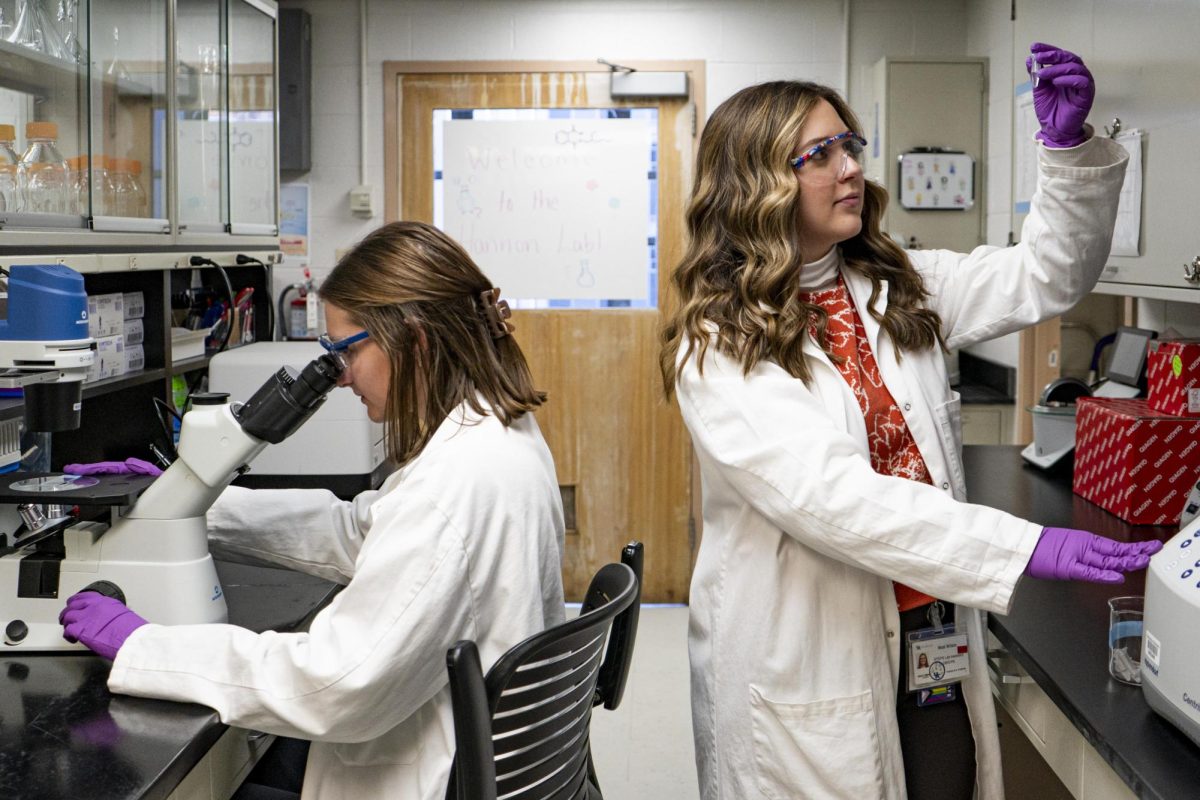Students trickle into the room as sunlight peeks through the large windows.
Some come in talking with friends. Others keep their earbuds in as they pull out their phones.
The sound of Rihanna’s music plays while volunteers sing and dance as they pick up a plate.
“It smells so good,” one student said before nodding to the question of a vegetarian meal.
A table of four custodial workers laugh as they share a meal together.
In Funkhouser Room 207, this is a weekly occurrence.
This is Farm to Fork.
Farm to Fork, hosted by Campus Kitchen, gives students on the University of Kentucky’s campus access to a nutritious, home-cooked meal free of charge, according to the university.
“It feels nice not to worry about one meal per week,” junior Bethany Escalante-Felix said.
Escalante-Felix said she has been coming to Farm to Fork for about two months after seeing a poster on campus.
“Sometimes I don’t bring food because I’m a little limited at home, so it was really nice to know that there’s a place where I can eat for free,” Escalante-Felix said.
Food insecurity, Farm to Fork co-chair Olivia Dixon said, affects 40% of college students in the United States, which makes Campus Kitchen a crucial organization on campus.
“In Funkhouser, we serve normally like 100-115 (meals) and then depending on the week, we send 15 to 20 meals to Ag North,” Dixon said.
With over a hundred people expecting a meal every week, Payton Abney, Campus Kitchen’s president said there are many challenges throughout the process.
Abney said there is sometimes a lack of food, which forces them to be creative in meal planning.
“I always tell people, it’s kind of like the show ‘Chopped,’ when they put a bunch of different ingredients in a basket and then you open it up and you have to figure out what to do with it. That’s kind of what we do every single day,” Abney said.
Campus Kitchen sometimes also struggles to have enough volunteers, putting stress on the shift captains, Lindsay Huff, the other Farm to Fork co-chair, said.
There are four shifts, Huff said, that ensure Farm to Fork flows smoothly. These include the recovery shift, where the food donations get picked up from local businesses and restaurants, the processing shift, which does tasks like chopping up and prepping vegetables, the cooking shift, and finally the delivery shift or the serving shift.
These four shifts and everything that makes Farm to Fork and Campus Kitchen possible is “completely led by student volunteers,” Abney said.
Abney said she started volunteering her freshman year, but after connecting with the mission, completing the work and seeing the amount of food they work with, she “fell in love with it.”
“Sometimes it’s a lot of work and it gets busy and things go wrong, but at the end of the day, we’re all working to do some really amazing things, even if we don’t see it every day,” she said.
Abney said many people think of food insecurity as having no food, but in reality, many students probably are in some ways food insecure.
Food insecurity, Abney said, could be worrying about making rent and buying groceries in the same week or going to a fast-food restaurant because healthier options can be too expensive.
“You’re not alone if you’re food insecure like, everybody I feel in this room has experienced at some time being like, it’s a little too expensive for me right now or, you know, I need to maybe figure out a better option. And just knowing that that’s okay, and that we’re here as a resource to provide you a meal,” Abney said.
From the farm to the fork, Abney said she hopes Campus Kitchen continues to grow and connect students across UK’s campus.




























































































































































